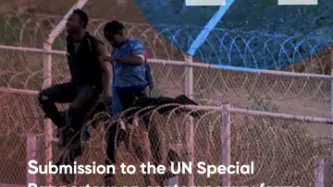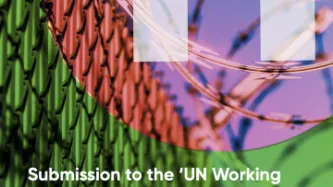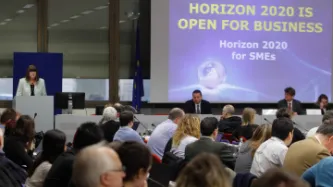Search
Content type: Examples
Human rights experts have accused the home secretary, Priti Patel, of ignoring legal guidance in an attempt to target child asylum seekers who cannot prove they are under 18.
A letter from the Home Office, seen by the Observer, reveals that the government is putting pressure on social workers to speed up the age assessment of unaccompanied minors, and offering to bankroll councils that face legal challenges as a result. The move comes as new evidence shows that hundreds of people were deported…
Content type: News & Analysis
A new report by the UN Working Group on mercenaries analyses the impact of the use of private military and security services in immigration and border management on the rights of migrants, and highlights the responsibilities of private actors in human rights abuses as well as lack of oversight and, ultimately, of accountability of the system.
Governments worldwide have prioritised an approach to immigration that criminalises the act of migration and focuses on security.
Today, borders are not…
Content type: News & Analysis
In the last few weeks, the UK government has announced various new measures to ensure that crossings across the Channel were “inviable” including by appointing a new role of “clandestine Channel threat commander" and further plans to deploy the navy to stop migrants from crossing to the UK from France across the Channel. Premature plans it seems, as not only would such measures be contrary to the UK’s international obligations to allow individuals to seek asylum in the UK, but also since such…
Content type: Explainer
In the name of reinforcing migration control and increasing security, the EU is introducing a host of new surveillance measures aimed at short-term visitors to the Schengen area. New tools and technologies being introduced as part of the visa application process and the incoming “travel authorisation” requirement include automated profiling systems, a ‘pre-crime’ watchlist, and the automated cross-checking of numerous national, European and international databases. There are significant risks…
Content type: Examples
The US Immigration and Customs Enforcement service announced in July that the State Department will not issue visas to students whose universities shift to online-only learning and they must leave the country or face deportation. More than 1 million higher education students in the US come from overseas, though enrollment has been declining since 2016, and the move is a blow to university budgets. Eight percent are planning to operate online-only, 60% are planning for in-person instruction, and…
Content type: Long Read
Over the last two decades we have seen an array of digital technologies being deployed in the context of border controls and immigration enforcement, with surveillance practices and data-driven immigration policies routinely leading to discriminatory treatment of people and undermining peoples’ dignity.And yet this is happening with little public scrutiny, often in a regulatory or legal void and without understanding and consideration to the impact on migrant communities at the border and…
Content type: Case Study
The EU have been using foreign aid budgets, not to lift people out of poverty, but to export surveillance technologies used to repress people’s human rights all over the world.
A wave of anti-immigration fervour has swept across Europe in recent years. As leaders have come to power across Europe either on anti-immigration platforms or having to respond to an anti-immigration sentiment, the EU’s recent policies have been shaped by the drive to stop migration to Europe.
Surveillance…
Content type: Advocacy
Privacy International (PI), Fundaciòn Datos Protegidos, Red en Defensa de los Derechos Digitales (R3D) and Statewatch responded to the call for submission of the UN Special Rapporteur on contemporary forms of racism, xenophobia and related intolerance on how digital technologies deployed in the context of border enforcement and administration reproduce, reinforce, and compound racial discrimination.
This submission provides information on specific digital technologies in service of border…
Content type: Long Read
There are few places in the world where an individual is as vulnerable as at the border of a foreign country.As migration continues to be high on the social and political agenda, Western countries are increasingly adopting an approach that criminalises people at the border. Asylum seekers are often targeted with intrusive surveillance technologies and afforded only limited rights (including in relation to data protection), often having the effect of being treated as “guilty until proven…
Content type: Examples
Taking advantage of the pandemic to close US borders, the Trump administration is also spreading coronavirus infection by deporting detainees to receiving countries such as Guatemala, where 20% of infections are deportees. Guatemala has only two hospitals and a scattering of smaller regional medical facilities to serve its population of 18 million people. As of April 2020, 5,000 Guatemalans were being held in detention in the US, and every week the Department of Homeland Security was sending…
Content type: Explainer
Social media platforms are a vast trove of information about individuals, including their personal preferences, political and religious views, physical and mental health and the identity of their friends and families.
Social media monitoring, or social media intelligence (also defined as SOCMINT), refers to the techniques and technologies that allow the monitoring and gathering of information on social media platforms such as Facebook and Twitter which provides valuable intelligence to others…
Content type: Advocacy
Privacy International responded to the call for submissions of the Working Group on the use of mercenaries as a means of violating human rights and impeding the exercise of the rights of peoples to self-determination on role of private military and security companies in immigration and border management and the impact on the protection of the rights of all migrants.
This submission builds on PI’s research and reporting highlighting examples of the involvement of private companies in…
Content type: Advocacy
To the Members of the European Parliament and to the Committee on Budgets of the European Parliament
The EU urgently needs to step up and provide assistance to protect the health and safety of people trapped in camps on the Greek islands - not just to protect their welfare, but to contain the virus itself as a matter of global public health.
However, as we detail in the briefing below, the current European Commission proposal for funds allocation is insufficient to ensure the safety of…
Content type: News & Analysis
Amid calls from international organisations and civil society urging for measures to protect the migrant populations in Greece and elsewhere, last week, the European Commission submitted a draft proposal to amend the general budget 2020 in order to, among other measures, provide assistance to Greece in the context of the COVID-19 outbreak.
Both at the Turkish-Greek border and in the camps on the Greek islands, there are severe concerns not only about the dire situation in which these people…
Content type: Advocacy
The letter has been signed by more than 40 organisations and it is open for individuals to sign.
At the moment, the Department of Health and Social Care has given no assurance that NHS data will not be shared with the Home Office and used for immigration enforcement, including for those people with a confirmed coronavirus diagnosis.
Assurances which were confirmed by the Irish government as part of their response to COVID-19: last week, during a Parliamentary debate, Irish Minister of Health…
Content type: Case Study
There are 29.4 million refugees and asylum seekers across the globe today. These are people who have fled their countries due to conflict, violence or persecution seeking protection in safer environments.
People have protected those in need fleeing from dire situations since antiquity. However, over recent years, European countries have become increasingly hostile towards refugees - treating them as criminals instead of people in need.
In 2017, German authorities passed a…
Content type: Long Read
It was a quiet evening in Agadez, a bustling Saharan city in the centre of Niger. Thirty-five year old Agali Ahmed was sipping tea at a friend’s place, as he often did, when he received a message: police were at his uncle’s house. When he got there, Ahmed saw men in plainclothes, standing around the building’s gate. Inside, more men were searching the apartment. Three white men, who Ahmed guessed were Spanish, asked for his phone and started taking pictures of him. They told him to follow them…
Content type: Long Read
The European Union (EU) spends billions on research and development aimed at driving economic growth and jobs, as well as furthering the bloc’s broader agenda. Within the current budget, known as Horizon 2020 and covering the years 2014-2020, some €80 billion has been made available for research in a huge number of areas, ranging from finding cures for diseases to helping keep the earth viable for life.
From the same budget, it also funds a lot of projects aimed at developing surveillance…
Content type: Advocacy
As any data protection lawyer and privacy activist will attest, there’s nothing like a well-designed and enforced data protection law to keep the totalitarian tendencies of modern Big Brother in check.
While the EU’s data protection rules aren’t perfect, they at least provide some limits over how far EU bodies, governments and corporations can go when they decide to spy on people.
This is something the bloc’s border control agency, Frontex, learned recently after coming up with a plan to…
Content type: Long Read
This research is the result of a collaboration between Grace Tillyard, a doctoral researcher in the Media, Communications and Cultural Studies department at Goldsmiths College, London, and Privacy International.
Social Protection Systems in the Digital Age
In the digital age, governments across the world are building technologically integrated programmes to allow citizens to access welfare payments. While smart and digital technologies hold the potential to streamline administrative…
Content type: News & Analysis
Photo: The European Union
“Border Externalisation”, the transfer of border controls to foreign countries, has in the last few years become the main instrument through which the European Union seeks to stop migratory flows to Europe. Similar to the strategy being implemented under Trump’s administration, it relies on utilising modern technology, training, and equipping authorities in third countries to export the border far beyond its shores.
It is enabled by the adoption…
Content type: Long Read
Photo: Francesco Bellina
Driven by the need to never again allow organised mass murder of the type inflicted during the Second World War, the European Union has brought its citizens unprecedented levels of peace underpinned by fundamental rights and freedoms.
It plays an instrumental role in protecting people’s privacy around the world; its data protection regulation sets the bar globally, while its courts have been at the forefront of challenges to unlawful government surveillance…
Content type: Examples
A 17-year-old Palestinian resident of Lebanon, Ismail B. Ajjawi, was deported shortly after he arrived at Boston Airport, where he was due to start attending Harvard University the following week.
Immigration officers subjected him to hours of questioning — at one point leaving to search his phone and computer — according to a written statement by Ajjawi. According to the student, his visa was revoked because of content posted by some social media contacts.
The student alleges that…
Content type: Examples
In 2018, repossession services in the US were experiencing a boom in business as the number of Americans failing to keep up with their car payments reached its highest point since 2012. One of these, Ohio-based Relentless Recovery, was increasing its hit rate by equipping its agents' vehicles with cameras to help it build a database of every license plate in the state along with the locations where the vehicles may be easily found. Repo agents collect most of the billions of license plate scans…
Content type: Examples
In February 2019, the UK Home Office told the Independent Chief of Borders and Immigration that it was planning to build a system that could check and confirm an individual's immigration status in real time to outside organisation such as employers, landlords, and health and benefits services. Lawyers and human rights campaigners expressed concerns that the project had received no scrutiny or public discussion, and that the Home Office's record suggested the result would be to unfairly lock…
Content type: Examples
In 2018, the UK Department of Education began collecting data for the schools census, a collection of children's data recorded in the national pupil database and including details such as age, address, and academic achievements. The DfE had collected data on 6 million English children when, in June 2018, opposition led the department to halt the project, which critics said was an attempt to turn schools into internal border checkpoints. In January 2019, however, in an answer to a Parliamentary…
Content type: Examples
The US Department of Homeland Security awarded a $113 million contract to General Dynamics to carry out the Visa Lifecycle Vetting Initiative (VLVI), a renamed version of the Extreme Vetting Initiative and part of a larger effort called the National Vetting Enterprise. In May 2018, public outrage led the DHS to back away from a machine learning system that would monitor immigrants continuously; however, the reason it gave was that the technology to automate vetting did not yet exist. These…
Content type: Examples
In October 2018, the answers to a FOIA request filed by the Project on Government Oversight revealed that in June 2018 Amazon pitched its Rekognition facial recognition system to US Immigration and Customs Enforcement officials as a way to help them target or identify immigrants. Amazon has also marketed Rekognition to police departments, and it is used by officers in Oregon and Florida even though tests have raised questions about its accuracy. Hundreds of Amazon workers protested by writing a…
Content type: Examples
In November 2018, 112 civil liberties, immigrant rights groups, child welfare advocates, and privacy activists wrote a letter to the heads of the US Department of Health and Human Services and the Department of Homeland Security demanding an immediate halt to the HHS Office for Refugee Resettlement's practice of using information given them by detained migrant children to arrest and deport their US-based relatives and other sponsors. The policy began in April 2018, and the result has been that…
Content type: Examples
In November 2018 the UK's Equality and Human Rights Commission warned that asylum seekers have been deterred from seeking medical help in Scotland and Wales since the UK government began forcing the English NHS to charge upfront in 2017 and by fears that medical personnel will comply with Home Office orders to forward their data. The commission, along with health charities and the Labour and LibDem political parties, called for the policy to be suspended. The Home Office policy of moving asylum…


















